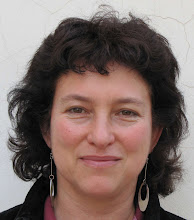 |
| I am your new blogger, Laura Wharton |
The current election campaign in Israel is certainly the most confusing the country has ever seen. The largest party in the current Knesset, the centrist “Kedima”, now holds 28 seats — but according to all the latest polls is not expected to pass the minimum percentage required to get even a single seat in the January elections. A relatively new party, “Habayit Hayehudi” on the far right, has taken in several young and popular former members of the Likud, together with their supporters: it is now expected to garner at least 12 seats, up from 3 seats in the current Knesset. A former television host and columnist, Yair Lapid, has formed a new party composed of a hodgepodge of mayors, a former police officer, a rabbi, an author, and other people he personally selected. Tzippi Livni, once acting prime minister, formed her own new party after having lost in the primary elections to lead her former party — the ill-fated Kedima. Livni has managed to enlist the support of a former head of the Labor Party, who left the party in frustration with its new chairman, the former radio journalist Sheli Yehimovitch.
Where does that leave the voters? In a mess. Polls say that with elections only three weeks away 30% of the electorate still hasn’t decided whom to support. It’s no wonder: not only have most of the parties shifted, merged or been subject to hostile takeovers — the issues are not clear. Netanyahu has gone on record as supporting a two-state solution but in the last four years has done absolutely nothing to progress in that direction (rather, quite the contrary). Yehimovitch, head of the Labor Party, talks almost exclusively about domestic economic issues and skirts questions relating to the settlements, a peace initiative, or the ultra-orthodox. Livni talks about foreign policy, although in her time as prime minister she accomplished little; she is vague on all economic issues, perhaps because she herself has been a strong supporter of massive privatization but has taken onto her list politicians like Amir Peretz, former head of the National Trade Union. The currently governing Likud has merged with its former rival, Israel Beytanu, and has published no party platform — perhaps a reason for its steady decline over the last several months.
In this context it seems to me refreshing that Meretz has taken a clear stance on all the issues,
renewed its platform, and sharpened its messages: for a two-state solution, for social justice and increased investment in social services, for greater separation between church and state. It is also the only party that has made it clear that it will not take part in a coalition with Netanyahu. Of course Meretz is a small party, expected now to get only 6 mandates (though up from its current 3). It is also not everyone’s cup of tea, since after so many wars many Israelis have lost hope for a comprehensive or lasting peace. Yet if, as expected, Netanyahu will be forming yet another government with no clear aims and a mix of conflicting, bellicose parties, it is just as well that Meretz has established itself as a clear alternative. In this week’s mock elections at the Hebrew University, the party won 22 seats. At the University High School it won 28. And who knows? If Kadima has gone from 28 to 0 in one term, who knows what could happen to Meretz?
P.S. This is to introduce myself:
Born and bred in the U.S., I received a B.A. from Harvard before moving to Israel. I served in the IDF and then became a member of Kibbutz Kfar Blum. Since 1995, I have lived in Jerusalem and mostly been working at the Hebrew University where I recently completed a doctorate in political science; this fall I will be there as an adjunct lecturer. Since 2008, I have served as a member of Jerusalem’s City Council (a publicly-elected, non-paying position) as a representative of Meretz. I am also proud to be the mother of two wonderful children.






I believe you have made some mistakes:
1. The Habayit Hayehudi party is not a new one, it has been in the Knesset before.
2. Tzipi Livni wasn’t the prime minister of Israel. Nethanyahu was, even though Livni’s party Kadima recieved more votes.
3. Amir Peretz is no longer in the Labor party.
We thank this anonymous person for his/her comment. Let me try to respond:
1. While it’s true that Habayit Hayehudi is not brand new, it’s “relatively new,” as described by Dr. Wharton.
2. The question is not who was prime minister after the election; clearly, it’s Netanyahu. It’s who was PM before the election, after Olmert resigned. My belief is that Olmert remained as caretaker prime minister, with Livni as foreign minister.
3. Dr. Wharton makes exactly this point: Peretz is now part of Livni’s new party.
This post certainly puts a lot of order in this election campaign mess. Well written.
Merci beaucoup pour cette analyse rafraichissante!
En dépit de tout, on continue d’espérer!
gert DERIDDER
Welcome Laura!